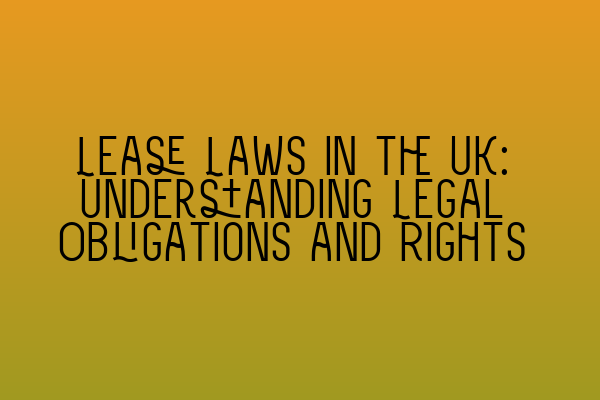Lease Laws in the UK: Understanding Legal Obligations and Rights
As a property owner or tenant in the United Kingdom, it is essential to have a clear understanding of lease laws. These laws outline the legal obligations and rights that both landlords and tenants have in a lease agreement. By familiarizing yourself with lease laws, you can protect your interests and ensure a smooth and successful tenancy.
In this comprehensive guide, we will delve into the key aspects of lease laws in the UK, providing you with the knowledge necessary to navigate the complexities of renting or letting property. So, let’s get started!
1. What is a Lease?
A lease is a legally binding agreement between a landlord (also known as a lessor) and a tenant (also known as a lessee). It grants the tenant the right to occupy and use the property for a specified period, typically ranging from six months to several years. During the lease term, the tenant pays rent to the landlord.
2. Types of Leases
There are various types of leases that you might come across in the UK. Understanding the differences between them is crucial, as each type carries its own set of rights and responsibilities.
– Assured Shorthold Tenancy (AST): This is the most common type of tenancy agreement in the UK. An AST provides tenants with security of tenure and imposes specific legal obligations on landlords, such as protecting the tenant’s deposit and providing a valid Gas Safety Certificate.
– Non-Assured Shorthold Tenancy: Non-AST agreements are typically used for high-value properties, rent exceeding £100,000 per year, or properties let to companies or trusts. These tenancies offer fewer protections compared to ASTs, so tenants need to be aware of their rights under such agreements.
– Common Law Tenancy: Common law tenancies, often referred to as “periodic tenancies,” are informal arrangements that can arise when a tenant continues to occupy the property after the initial fixed-term lease expires. These tenancies are not subject to the same regulations as ASTs, so it is important to establish clear terms with the landlord to avoid any misunderstandings.
3. Landlord’s Obligations
Landlords in the UK have several legal obligations that must be met to comply with lease laws. Here are some of the key responsibilities landlords must fulfill:
– Safety and Maintenance: Landlords are required to maintain a safe and habitable property, including ensuring that gas and electrical installations are safe, providing suitable heating, and addressing any necessary repairs promptly.
– Tenancy Deposit Protection: Landlords must protect tenants’ deposits in a government-approved tenancy deposit scheme and provide the tenant with prescribed deposit information within 30 days of receiving the deposit.
– Right to Rent Checks: Landlords are obliged to conduct right to rent checks to verify the immigration status of prospective tenants before letting the property.
4. Tenant’s Rights
As a tenant, it is essential to be aware of your rights to protect yourself from unfair practices. Here are some key rights granted to tenants under lease laws:
– Right to Safe and Habitable Accommodation: Tenants have the right to live in a safe and well-maintained property. If there are any hazards or maintenance issues that affect their health and safety, tenants should report them to the landlord promptly.
– Privacy and Peaceful Enjoyment: Tenants have the right to privacy and peaceful enjoyment of the property. Landlords must provide advance notice before entering the premises, except in cases of emergency.
– Right to Challenge Unfair Rent Increases: If a tenant believes that a rent increase is unfair, they have the right to challenge it through a rent assessment committee.
5. Termination of a Lease
There are various circumstances under which a lease agreement can be terminated. It is important to understand the termination process to protect your rights. Here are a few common scenarios:
– Expiration of the Lease Term: When the lease term comes to an end, the tenancy can be terminated automatically without any notice requirement, assuming both parties have fulfilled their obligations.
– Notice to Quit: This is a formal notice provided by either the landlord or the tenant to terminate the lease. The length of notice required depends on the type of tenancy and the agreement between the parties.
– Breach of Lease: If either the landlord or the tenant fails to meet their obligations under the lease agreement, it may constitute a breach, giving the innocent party the right to terminate the tenancy.
6. Seeking Legal Advice
While this guide provides a broad overview of lease laws in the UK, it is crucial to seek legal advice tailored to your specific situation. Lease laws can be complex and can vary depending on the type of property, location, and individual circumstances. Consulting a solicitor specializing in property law is highly recommended.
At SQE Property Law & Land Law, our team of expert solicitors is here to guide you through the intricacies of lease laws. Whether you are a landlord seeking legal advice or a tenant seeking to understand and protect your rights, our experienced professionals can provide the assistance you need.
For further information and resources to help you prepare for the SQE exams, check out our related articles:
– [SQE 1 Practice Exam Questions](https://fqps.co.uk/sqe/sqe1-preparation/mcq-practice-quiz)
– [SQE 1 Practice Mocks FLK1 FLK2](https://fqps.co.uk/sqe/sqe1-preparation/practice-mocks-quiz)
– [SQE 2 Preparation Courses](https://fqps.co.uk/sqe/sqe2-preparation)
– [SQE 1 Preparation Courses](https://fqps.co.uk/sqe/sqe1-preparation)
– [SRA SQE Exam Dates](https://fqps.co.uk/sqe/sqe1-sqe2-exam-dates)
In conclusion, understanding lease laws in the UK is crucial for both landlords and tenants. By familiarizing yourself with the legal obligations and rights involved in lease agreements, you can ensure a mutually beneficial tenancy and mitigate potential disputes. Remember, seeking legal advice from a qualified solicitor is always a wise decision to protect your interests.
